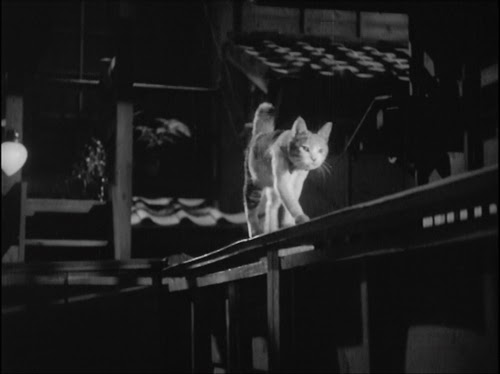'Flowing' (Nagareru) is a 1956 Japanese film directed by Mikio Naruse.
Oharu, a widow who has lost her child to an illness, takes a job as a maid in a geisha house in Tokyo. Otsuta is the owner, and the house is running into substantial debt. Her daughter, Katsuyo, also lives in the geisha house but is not a geisha, but worries about her mother. Namie, a geisha which had previously worked at the house, has an angry uncle, who keeps approaching the Otsuta for money Namie owes him. Otsuta's younger sister, Yoneko, is staying at the house with her ill daughter. The other two geishas Nanako and Someka also have problems. Someka owes Otsuya's older sister, Otoyo, money while Nanako has unreliable man problems.
Half of Naruse's films are about geishas (Woman Ascends the Stairs, Late Chrysanthemums) while the other half are smaller family based dramas (Sound of the Mountain, Repast). This film, belongs to the prior, that is about geishas, Japan's classier version of prostitutes. 'Flowing' has a large ensemble cast, filled with the finest Japanese actresses.
1956 was an important year in Japan, as it's the year that prostitution was outlawed. Due to the year, the large cast and the topic, you could easily confuse this film with Mizoguchi's 'Akasen Chitai'. The two films are incredibly similar, the only difference is that 'Akasen Chitai' focuses on a selfish character as one of the geishas, while 'flowing' has a maid as a character. 'Akasen Chitai' has a shockingly tragic ending, which 'Flowing' avoids any tragic elements.
'Flowing' is concerned with, as the title suggests, with the flowing of every day life. Insignificant factors, like the cat or the geisha lessons, are implemented into the story to make it feel like these events are happening. The realism is amplified creating a startling effect, like you are watching a documentary of sorts.
This film tells the daily-life of a group of geishas. The film is told from their perspective and doesn't feature any clients at all. The film throws a bunch of characters into a house and sees how they react to each other. The characters are all strong woman, that aren't ashamed of what they do and the audience can sympathize with all of them. This film has many fantastic characters, and in two hours you feel like you know every little detail about them.
Naruse is a combination of Mizoguchi's women and Ozu's camerawork and family dramas. I would say he is copying them, if he wasn't directing when they were. All of Naruse's trademark characteristics are present in this film. From the intricate, Ozu (and square) interiors, to the many gazes of the protagonists. Naruse intended 'Flowing' to be a woman's film (that is, a film about woman), and it is definitely that.
TO CONCLUDE
'Akasen Chitai' is a better film, but this is still a great film with wonderful characters.
SCORE
77

No comments:
Post a Comment